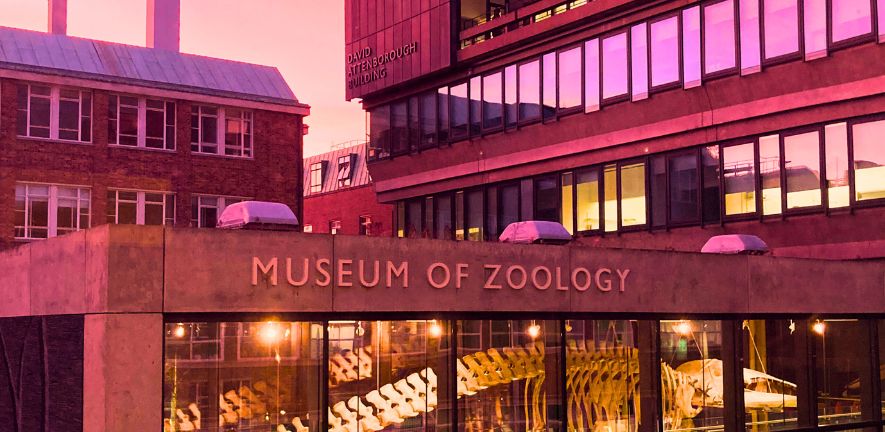The Department of Zoology in 6 figures:
-
2,000,000 zoological specimens in our museum
-
350 faculty, postgraduate students, research staff, fellows and visitors
-
50 professional services staff
-
£50m current value of our research grants
-
30 research groups
-
7 Fellows of the Royal Society among our 31 group leaders, honorary professors and fellows
We pride ourselves on the outstanding quality of our research and its impact. We develop and apply cutting-edge techniques, reanimate fossils from the deep past, map entire nervous systems and analyse ecosystems, and build simulations of worlds to come.
We take our responsibilities in nurturing this talent very seriously. Our support for them extends beyond the lecture theatre and the lab to include a dedicated administrative team, internal seminar days, social events, and study spaces that foster peer-to-peer relationships and facilitate informal ways to learn.
Undergraduate Teaching
Our undergraduate teaching enhances our research and is led by our latest discoveries. We are deeply committed to teaching, which involves all members of faculty. Students and external evaluators tell us we offer a warm, supportive and effective learning environment.
We are there when our second and third year students experience the first thrill of scientific discovery through their own research and we celebrate with our third years after their exams, as their time at Cambridge comes to an end.
Our formal teaching involves lectures, seminars, class debates, practicals and field courses and we dedicate some of the Department’s Trust Funds to supporting independent undergraduate research projects in the vacations.
More about undergraduate study with us
Postgraduate Education
Our Department includes around 100 MPhil and PhD students. Postgraduate students are based in a research group but quickly become part of a wider community, with additional academic and pastoral support offered by faculty members beyond their immediate research group.
We go the extra mile to ensure our postgraduate students are well-supported during their time with us by offering frequent cohort-building events and training opportunities for students and supervisors alike.
More about postgraduate study with us
The years spent as a post-doctoral researcher, junior or senior research fellow, offer immense intellectual freedom but are also a time of precarity.
We recognise this and have frameworks in place to support staff as well as possible during these critical years, and to guide their successful progression to the next career stage. This includes a mentoring scheme where we match researchers with scientists who can help them decide on the next steps for their future careers.
The Post-doc Committee gives people at this career stage a voice in how we run the Department and their needs are managed by the deputy Head of Department for Research.
We aim to create an inclusive, supportive, and open atmosphere for everyone who works here, staff, students, and visitors alike. We value and actively support diversity and aim to make our working practices as family-friendly as possible.
More abut equality, inclusion, and wellbeing in our department
The Museum of Zoology part of our Department and recently benefited from significant capital investment in its buildings and infrastructure. With roughly two million specimens in its collections, including some associated with Charles Darwin and Alfred Russel Wallace, it is an outstanding resource for research and teaching. The Museum runs a superb programme of learning and public engagement, frequently assisted by members of the Department. It attracts over 150,000 visitors each year and has a thriving network of connections with local schools and community groups. The Museum’s Whale Hall is regularly used for evening events by members of the University, charities and local businesses.
We are closely integrated with the Cambridge Conservation Initiative (CCI), with whom we share the David Attenborough Building. This unique collaboration with other University departments and leading internationally focused biodiversity conservation organisations, informs conservation policy and practice worldwide.
We can trace the origins of the Department of Zoology back to 1592 when William Harvey arrived at Caius College to conduct research on the circulation of blood and development of the chick.
Zoology Library
The library’s collection includes thousands of books covering the breadth of zoology teaching and research, some of which are over 500 years old. The library is a pleasant and quiet study space in the historic heart of our oldest building.
The official name of the Zoology Library is the Balfour & Newton Libraries, in memory of Francis Maitland Balfour, Professor of Animal Morphology, and Alfred Newton, the first Professor of Zoology.
Balfour's books, given by his family to form the nucleus of the Library. The Newton collection, of ornithological importance, was bequeathed to the Museum of Zoology in 1907.
Cambridge Biotomography Centre
The Centre hosts an industry-leading X-ray and CT system range for non-destructive, high-resolution inspection and metrology. The CBC is housed in the basement of the Museum.
Imaging Facility
The Zoology Imaging Facility is part of the School of Biological Sciences Microscopy Bioscience Platform. It provides members of the Department and the wider research community with access to confocal microscopes. High-performance computer workstations are available for image processing and analysis.

